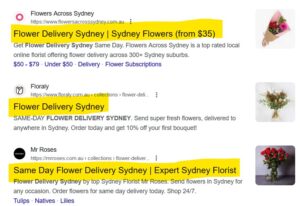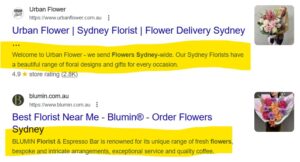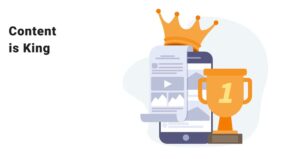Home » Creating Meta Titles
How to Create Quality Meta Titles for Your Website
 Meta titles are crucial elements of search engine optimisation (SEO) that significantly impact your website’s visibility and click-through rate (CTR) in search engine results pages (SERPs). A well-crafted meta title not only helps search engines understand the content of your page but also entices users to click through to your site. In this article, we will explore how to create quality meta titles that enhance your SEO strategy and improve your online presence.
Meta titles are crucial elements of search engine optimisation (SEO) that significantly impact your website’s visibility and click-through rate (CTR) in search engine results pages (SERPs). A well-crafted meta title not only helps search engines understand the content of your page but also entices users to click through to your site. In this article, we will explore how to create quality meta titles that enhance your SEO strategy and improve your online presence.
See what Google has to say about creating meta titles.
What is a Meta Title?
A meta title (or title tag) is an HTML element that specifies the title of a web page. It appears in three key places:
- Search Engine Results Pages: The meta title is often the first thing users see in SERPs, making it critical for attracting clicks.
- Browser Tabs: The meta title is displayed on the browser tab, helping users identify which page they are viewing.
- Social Media Sharing: When shared on social media platforms, the meta title is usually displayed as the headline for the link.
Why Are Quality Meta Titles Important?
-
SEO Benefits: Search engines like Google use meta titles to understand the content of a page. Including relevant keywords in your meta title can improve your rankings for those terms.
-
User Engagement: A compelling and descriptive title can entice users to click on your link instead of others, improving your CTR.
-
Brand Recognition: Including your brand name in the meta title can help increase brand awareness and recognition over time.
Tips for Creating Quality Meta Titles
-
Keep It Concise: Aim for a meta title length of 50 to 60 characters. Titles that are too long may get cut off in search results, which can lead to missed opportunities for engagement.
-
Include Target Keywords: Incorporate relevant keywords that accurately describe the page content. This helps with SEO and makes it clear to users what they can expect from your page.
-
Be Descriptive and Specific: Clearly convey the content and purpose of the page in your title. Users should know exactly what they will find when they click on your link.
-
Create Unique Titles for Each Page: Each page on your website should have a distinct meta title. This avoids confusion for both users and search engines, ensuring that each page is appropriately indexed.
-
Use Actionable Language: Consider using action verbs or compelling phrases that encourage users to take action. Phrases like “Discover,” “Learn,” or “Get Started” can make your title more engaging.
-
Reflect Your Brand: If appropriate, include your brand name at the end of the title to reinforce brand recognition. This is especially important for well-known brands or businesses aiming to build their reputation.
-
Avoid Keyword Stuffing: While it’s important to include keywords, overloading your title with them can appear spammy and reduce readability. Focus on creating a natural and informative title.
-
Consider User Intent: Think about the intent behind the keywords you’re targeting. Are users looking for information, a product, or a service? Tailor your title to align with their needs and expectations.
Examples of Quality Meta Titles
- E-commerce Page: “Stylish Summer Dresses for Women | Shop Now at [Brand Name]”
- Blog Post: “10 Essential Tips for Starting a Successful Blog”
- Service Page: “Professional SEO Services in Melbourne | Boost Your Online Presence”
- Landing Page: “Get Affordable Home Insurance Quotes | Compare Plans Today”
Tools for Optimising Meta Titles
Several online tools can help you optimise your meta titles:
- Google Keyword Planner: Use this tool to find relevant keywords and assess their search volume.
- Yoast SEO: A popular WordPress plugin that offers real-time feedback on your meta titles and overall SEO optimisation.
- SEMrush: An all-in-one marketing toolkit that provides insights into keyword usage and competitor analysis.
Conclusion
Creating quality meta titles is an essential part of effective SEO strategy. By crafting concise, descriptive, and keyword-rich titles, you can improve your website’s visibility in search results, increase click-through rates, and enhance user engagement. Regularly review and optimise your meta titles to ensure they reflect your current content and align with your audience’s interests. With the right approach, quality meta titles can significantly contribute to your website’s overall success and online presence.
If you do not have the time or skills to update the meta titles on your website we can help. Contact our team today to discuss the range of SEO packages we have available.




